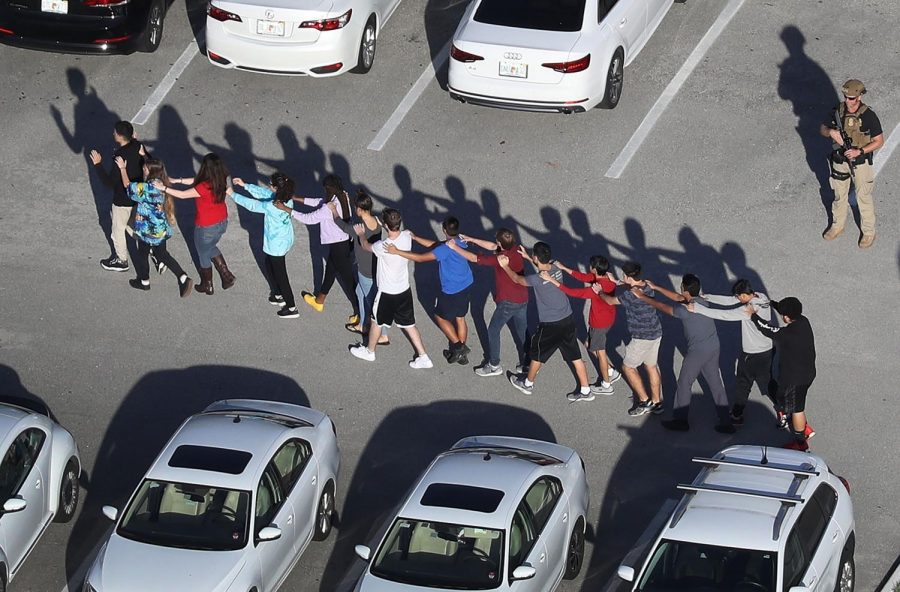Terror survivors deserve continued care
Photo Courtesy of Tribune News Service
People are brought out of the Marjory Stoneman Douglas High School after a shooting at the school that reportedly killed and injured multiple people on February 14, 2018 in Parkland, Florida. Numerous law enforcement officials continue to investigate the scene.
Mar 29, 2019
School shootings have become a frequent topic of conversation in the last few years. The discourse is divisive and political at times, and at other times unifying and uplifting. But the effect of these tragedies on surrounding communities is sometimes an afterthought. The trauma inflicted on those closest to the victims should be addressed more seriously.
On Feb. 14, 2018, the world watched in horror as news of the Marjory Stoneman Douglas shooting rolled in. Seventeen children and staff were killed, another 17 were injured. Rallies ensued, vociferous speeches erupted from the mouths of the children who were survivors of a bloody attack.
Those students who spoke out in the days and weeks following the attack amassed a large following. Emma Gonzalez and David Hogg became household names.
But the outspoken students were not the only people impacted by that day’s tragedy .
On March 17, Sydney Aiello became the 18th victim of the attack when she took her own life at 19. Aiello was not in the room where the shooting took place, but was close friends with one of the 14 students killed that day. Six days later, 16-year-old Calvin Desir committed suicide as well. Desir was another student at Marjory Stoneman Douglas during last year’s attack.
Get The Daily Illini in your inbox!
On March 25, Jeremy Richman, the father of one of the victims of the Sandy Hook massacre, was found dead in the building that housed his office for the “Avielle Foundation.” This foundation was named and set up in honor of his late daughter, and promoted community engagement and education in a hope of preventing violence.
While the world has mourned the lives lost at Marjory Stoneman Douglas on that horrific day last year, the impact of the event on the surrounding community has perhaps been an afterthought. Tragedy is tragedy, and the events of the school shootings cannot and should not be compared to these two suicides. There are also countless other individuals and communities suffering from the effects of gang violence, neglect and assault.
The relatives and friends of the victims of violence are forever changed after they experience such grave loss like the Sandy Hook and Parkland shootings.
And it is our collective duty to not turn away from these individuals after tragedy.
As University students, the topic of mental health and suicide is deeply ingrained in our collective experiences. It is rare not to know someone who has dealt with mental health struggles. The conversation has started, but reality is showing that knowing this information is not enough to spur real change.
We are quick to point out resources available to help those suffering from issues of mental health. And our University has resources like Kognito At-Risk Suicide Prevention Training and INNER VOICES Social Issues Theatre. There are also assistance centers like the Counseling Center and Women’s Resources Center. But all the training and assistance centers will not help without actively engaging in conversation on these topics, and truly beginning to live in a manner of looking out for the people around us.
These conversations cannot only take place in the immediate aftermath of tragedy, but need to be continued over time. There needs to be more genuine discourse on these subjects so those in the know can help those in need, and those need know who to turn to and where to turn for assistance.
Hayley is a senior in ACES.






